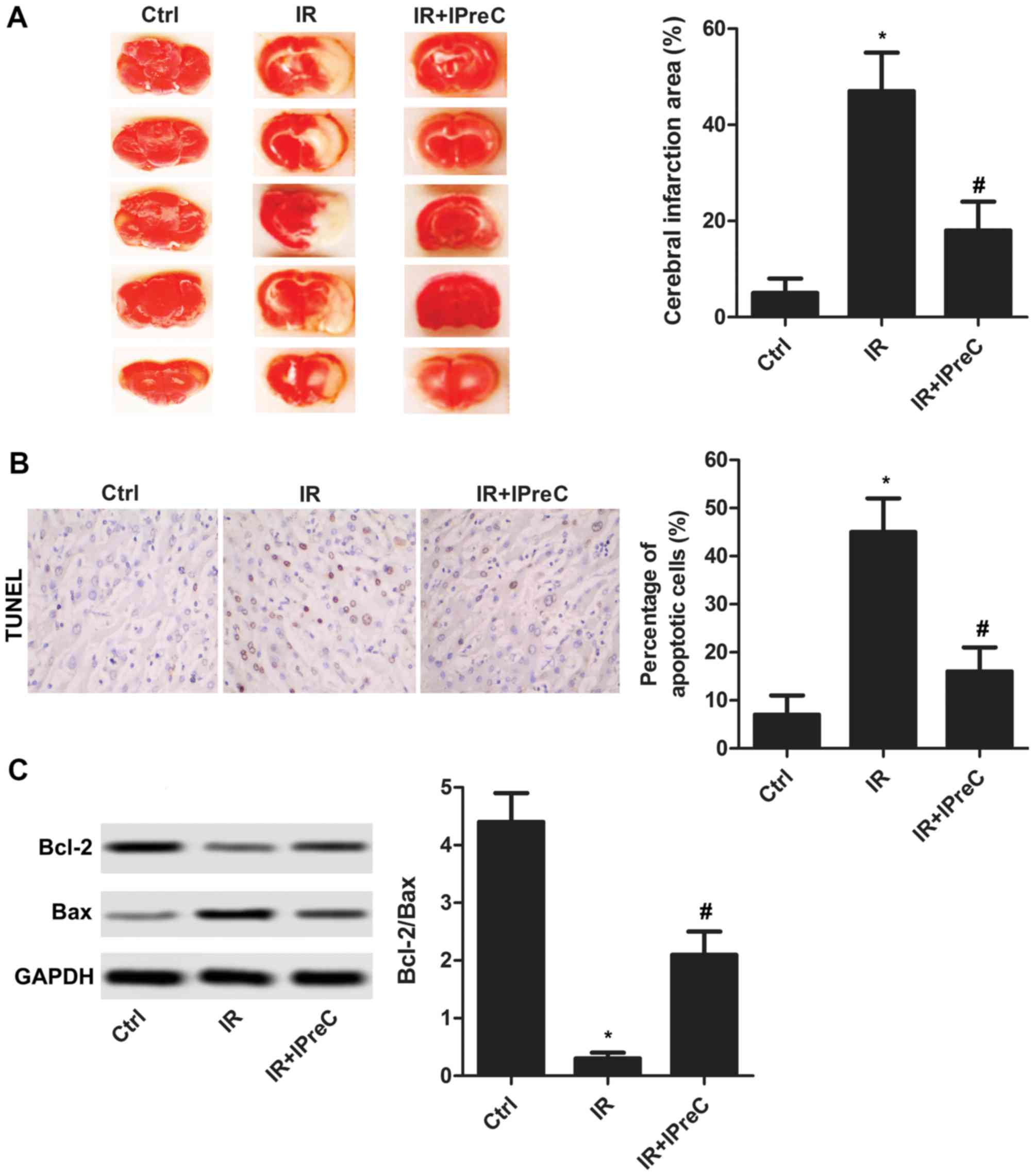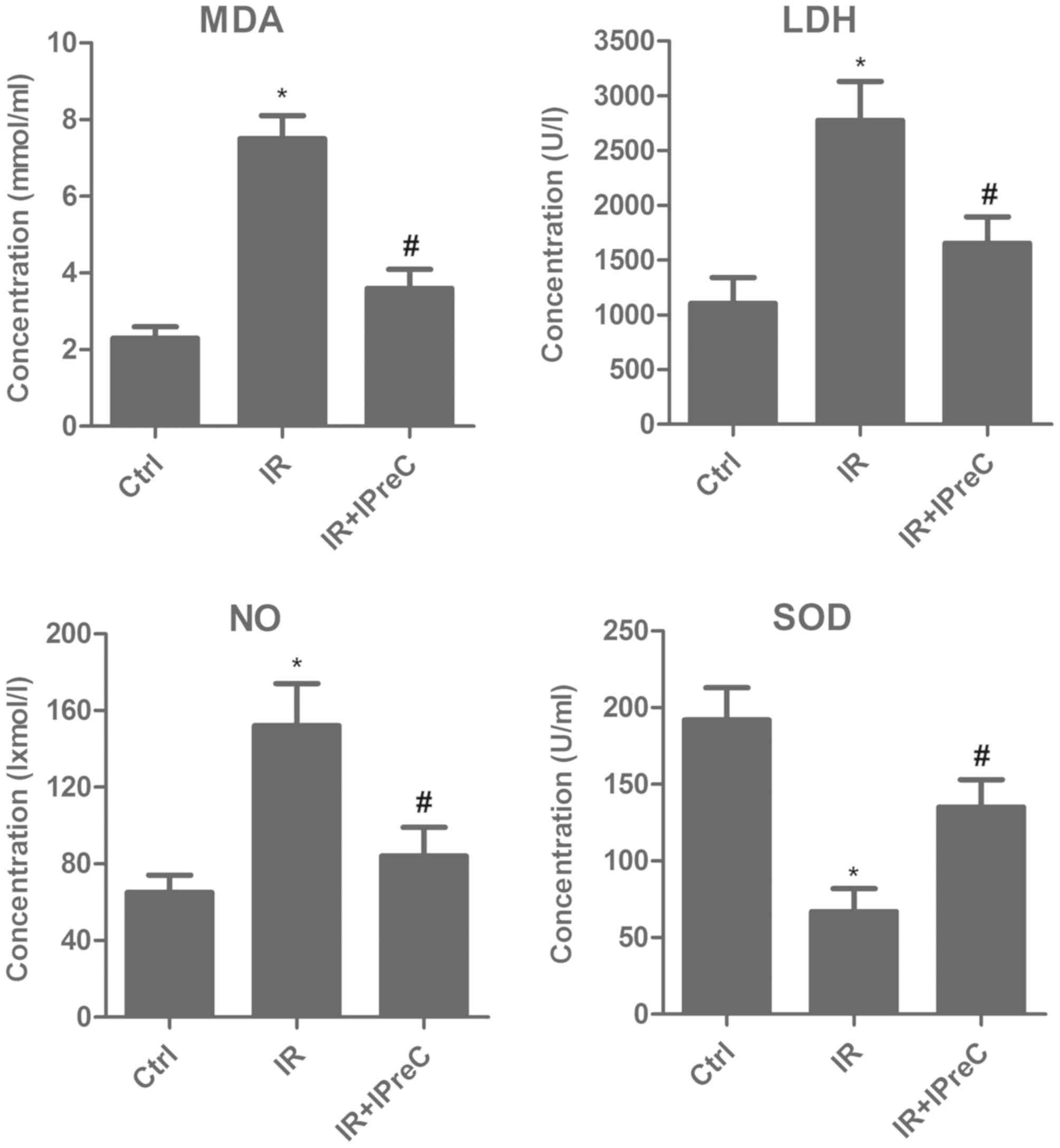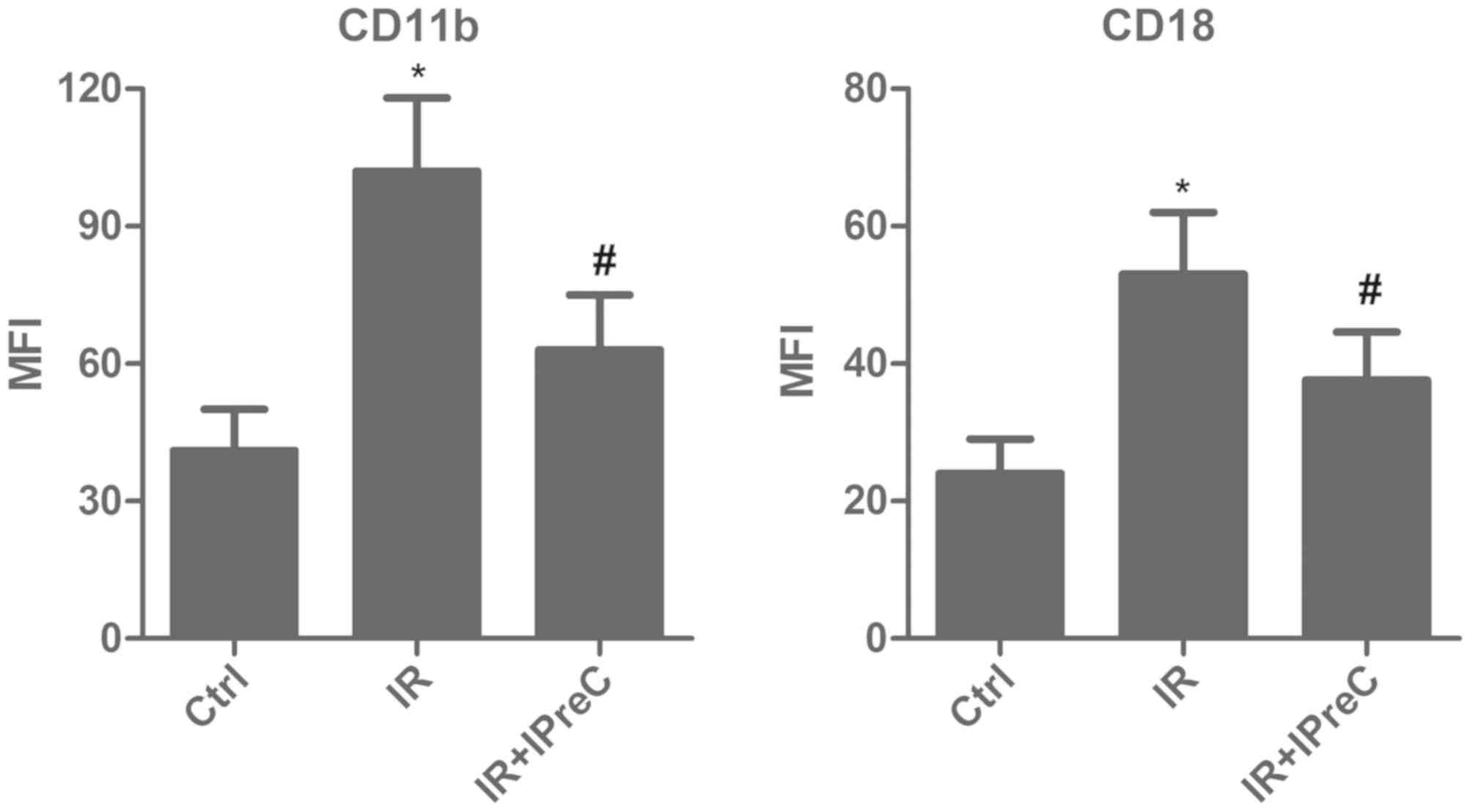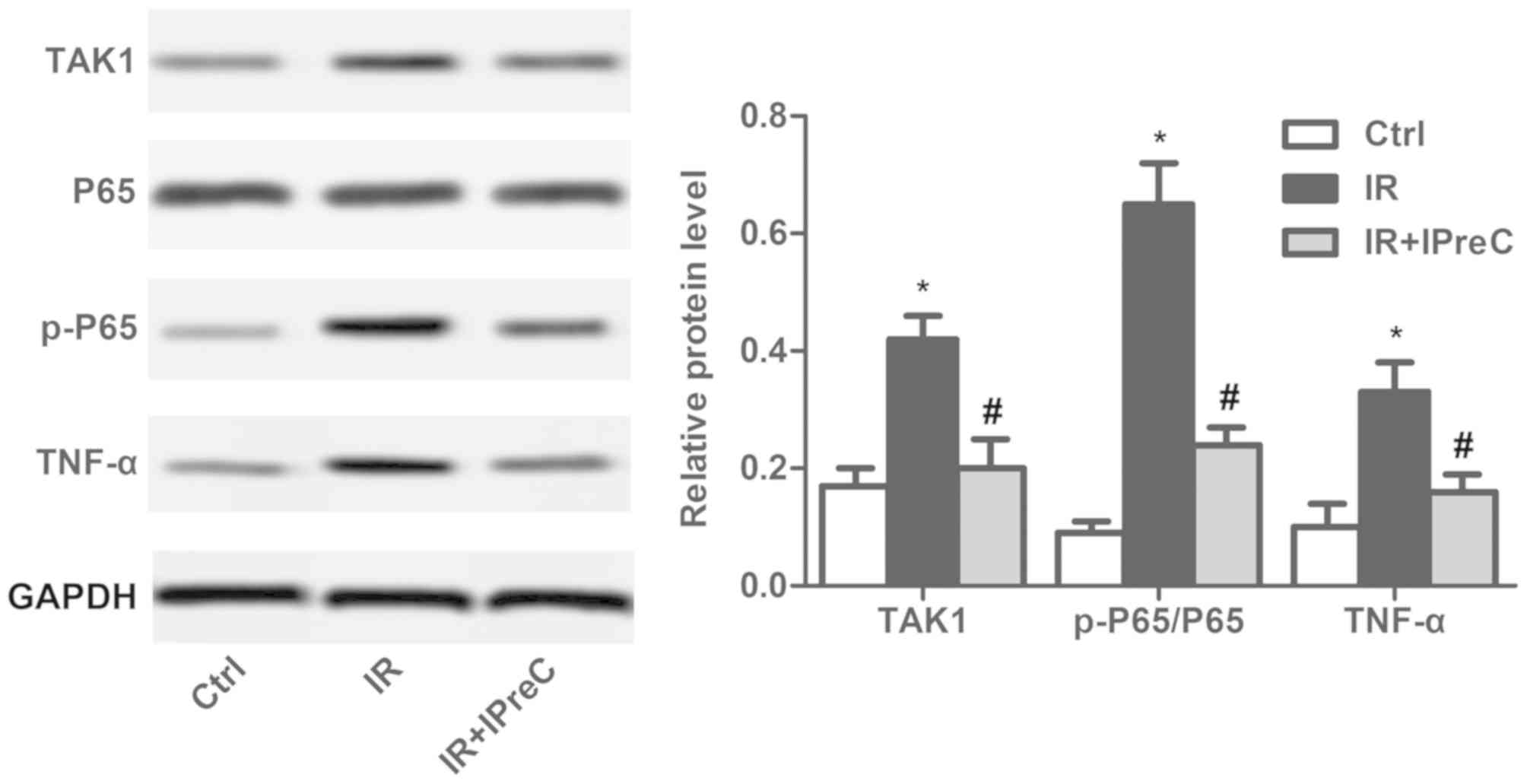|
1
|
Mestriner RG, Saur L, Bagatini PB,
Baptista PP, Vaz SP, Ferreira K, Machado SA, Xavier LL and Netto
CA: Astrocyte morphology after ischemic and hemorrhagic
experimental stroke has no influence on the different recovery
patterns. Behav Brain Res. 278:257–261. 2015. View Article : Google Scholar : PubMed/NCBI
|
|
2
|
Gomis M and Davalos A: Recanalization and
reperfusion therapies of acute ischemic stroke: What have we
learned, what are the major research questions, and where are we
headed? Front Neurol. 5:2262014. View Article : Google Scholar : PubMed/NCBI
|
|
3
|
Fjetland L and Roy S: Transcarotid
endovascular thrombectomy for acute ischemic stroke. J Vasc Int
Radiol. 29:1006–1010. 2018. View Article : Google Scholar
|
|
4
|
Chouchani ET, Pell VR, Gaude E,
Aksentijević D, Sundier SY, Robb EL, Logan A, Nadtochiy SM, Ord
ENJ, Smith AC, et al: Ischaemic accumulation of succinate controls
reperfusion injury through mitochondrial ROS. Nature. 515:431–435.
2014. View Article : Google Scholar : PubMed/NCBI
|
|
5
|
Hu YQ, Chen W, Yan MH, Lai JJ, Tang N and
Wu L: Ischemic preconditioning protects brain from
ischemia/reperfusion injury by attenuating endoplasmic reticulum
stress-induced apoptosis through PERK pathway. Eur Rev Med
Pharmacol Sci. 21:5736–5744. 2017.PubMed/NCBI
|
|
6
|
Murry CE, Jennings RB and Reimer KA:
Preconditioning with ischemia: A delay of lethal cell injury in
ischemic myocardium. Circulation. 74:1124–1136. 1986. View Article : Google Scholar : PubMed/NCBI
|
|
7
|
Wegener S, Gottschalk B, Jovanovic V, Knab
R, Fiebach JB, Schellinger PD, Kucinski T, Jungehülsing GJ,
Brunecker P, Müller B, et al: Transient ischemic attacks before
ischemic stroke: Preconditioning the human brain? A multicenter
magnetic resonance imaging study. Stroke. 35:616–621. 2004.
View Article : Google Scholar : PubMed/NCBI
|
|
8
|
Lehotsky J, Burda J, Danielisova V,
Gottlieb M, Kaplan P and Saniova B: Ischemic tolerance: The
mechanisms of neuroprotective strategy. Anat Rec (Hoboken).
292:2002–2012. 2009. View
Article : Google Scholar : PubMed/NCBI
|
|
9
|
Hess DC, Hoda MN and Bhatia K: Remote limb
perconditioning [corrected] and postconditioning: Will it translate
into a promising treatment for acute stroke? Stroke. 44:1191–1197.
2013. View Article : Google Scholar : PubMed/NCBI
|
|
10
|
Thompson JW, Dave KR, Young JI and
Perez-Pinzon MA: Ischemic preconditioning alters the epigenetic
profile of the brain from ischemic intolerance to ischemic
tolerance. Neurotherapeutics. 10:789–797. 2013. View Article : Google Scholar : PubMed/NCBI
|
|
11
|
Yunoki M, Kanda T, Suzuki K, Uneda A,
Hirashita K and Yoshino K: Ischemic tolerance of the brain and
spinal cord: A review. Neurol Med Chir (Tokyo). 57:590–600. 2017.
View Article : Google Scholar : PubMed/NCBI
|
|
12
|
Schoen M, Rotter R, Gierer P, Gradl G,
Strauss U, Jonas L, Mittlmeier T and Vollmar B: Ischemic
preconditioning prevents skeletal muscle tissue injury, but not
nerve lesion upon tourniquet-induced ischemia. J Trauma.
63:788–797. 2007. View Article : Google Scholar : PubMed/NCBI
|
|
13
|
Jeffries O, Waldron M, Pattison JR and
Patterson SD: Enhanced local skeletal muscle oxidative capacity and
microvascular blood flow following 7-day ischemic preconditioning
in healthy humans. Front Physiol. 9:4632018. View Article : Google Scholar : PubMed/NCBI
|
|
14
|
Dong S, Cao Y, Li H, Tian J, Yi C and Sang
W: Impact of ischemic preconditioning on ischemia-reperfusion
injury of the rat sciatic nerve. Int J Clin Exp Med. 8:16245–16251.
2015.PubMed/NCBI
|
|
15
|
Granger DN and Kvietys PR: Reperfusion
injury and reactive oxygen species: The evolution of a concept.
Redox Biol. 6:524–551. 2015. View Article : Google Scholar : PubMed/NCBI
|
|
16
|
Wanchao S, Chen M, Zhiguo S, Futang X and
Mengmeng S: Protective effect and mechanism of Lactobacillus on
cerebral ischemia reperfusion injury in rats. Braz J Med Biol Res.
51:e71722018. View Article : Google Scholar : PubMed/NCBI
|
|
17
|
Valko M, Leibfritz D, Moncol J, Cronin MT,
Mazur M and Telser J: Free radicals and antioxidants in normal
physiological functions and human disease. Int J Biochem Cell Biol.
39:44–84. 2007. View Article : Google Scholar : PubMed/NCBI
|
|
18
|
Matsuda S, Umeda M, Uchida H, Kato H and
Araki T: Alterations of oxidative stress markers and apoptosis
markers in the striatum after transient focal cerebral ischemia in
rats. J Neural Transm (Vienna). 116:395–404. 2009. View Article : Google Scholar : PubMed/NCBI
|
|
19
|
Angelova PR and Abramov AY: Role of
mitochondrial ROS in the brain: From physiology to
neurodegeneration. FEBS Lett. 592:692–702. 2018. View Article : Google Scholar : PubMed/NCBI
|
|
20
|
Yao Y, Chen L, Xiao J, Wang C, Jiang W,
Zhang R and Hao J: Chrysin protects against focal cerebral
ischemia/reperfusion injury in mice through attenuation of
oxidative stress and inflammation. Int J Mol Sci. 15:20913–20926.
2014. View Article : Google Scholar : PubMed/NCBI
|
|
21
|
Singh V, Krishan P and Shri R:
Antioxidant-mediated neuroprotection by allium schoenoprasum L.
leaf extract against ischemia reperfusion-induced cerebral injury
in mice. J Basic Clin Physiol Pharmacol. 29:403–410. 2018.
View Article : Google Scholar : PubMed/NCBI
|
|
22
|
Bohacek I, Cordeau P, Lalancette-Hebert M,
Gorup D, Weng YC, Gajovic S and Kriz J: Toll-like receptor 2
deficiency leads to delayed exacerbation of ischemic injury. J
Neuroinflammation. 9:1912012. View Article : Google Scholar : PubMed/NCBI
|
|
23
|
Chapman SN, Mehndiratta P, Johansen MC,
McMurry TL, Johnston KC and Southerland AM: Current perspectives on
the use of intravenous recombinant tissue plasminogen activator
(tPA) for treatment of acute ischemic stroke. Vasc Health Risk
Manag. 10:75–87. 2014.PubMed/NCBI
|
|
24
|
del Zoppo GJ: Acute anti-inflammatory
approaches to ischemic stroke. Ann N Y Acad Sci. 1207:143–148.
2010. View Article : Google Scholar : PubMed/NCBI
|
|
25
|
Clemens JA, Stephenson DT, Dixon EP,
Smalstig EB, Mincy RE, Rash KS and Little SP: Global cerebral
ischemia activates nuclear factor-kappa B prior to evidence of DNA
fragmentation. Brain Res Mol Brain Res. 48:187–196. 1997.
View Article : Google Scholar : PubMed/NCBI
|
|
26
|
Subedi L, Venkatesan R and Kim SY:
Neuroprotective and anti-inflammatory activities of allyl
isothiocyanate through attenuation of JNK/NF-κB/TNF-α signaling.
Int J Mol Sci. 18:E14232017. View Article : Google Scholar : PubMed/NCBI
|
|
27
|
Wang L, Zhang Y, Asakawa T, Li W, Han S,
Li Q, Xiao B, Namba H, Lu C and Dong Q: Neuroprotective effect of
neuroserpin in oxygen-glucose deprivation- and
reoxygenation-treated rat astrocytes in vitro. PLoS One.
10:e01239322015. View Article : Google Scholar : PubMed/NCBI
|
|
28
|
Giacoppo S, Galuppo M, Iori R, De Nicola
GR, Bramanti P and Mazzon E: (RS)-glucoraphanin purified from
tuscan black kale and bioactivated with myrosinase enzyme protects
against cerebral ischemia/reperfusion injury in rats. Fitoterapia.
99:166–177. 2014. View Article : Google Scholar : PubMed/NCBI
|
|
29
|
Awooda HA, Lutfi MF, Sharara GM and Saeed
AM: Role of N-Nitro-L-Arginine-Methylester as anti-oxidant in
transient cerebral ischemia and reperfusion in rats. Exp Transl
Stroke Med. 5:12013. View Article : Google Scholar : PubMed/NCBI
|
|
30
|
Altintas O, Antar V, Baran O, Karatas E,
Altintas MO, Kesgin S, Buyukpinarbasili N, Kocyigit A and Asil T:
Neuroprotective effects of hemicraniectomy in malign middle
cerebral artery infarctions: Experimental study. J Neurosurg Sci.
2015.
|
|
31
|
Qi D, Liu H, Niu J, Fan X, Wen X, Du Y,
Mou J, Pei D, Liu Z, Zong Z, et al: Heat shock protein 72 inhibits
c-Jun N-terminal kinase 3 signaling pathway via Akt1 during
cerebral ischemia. J Neurol Sci. 317:123–129. 2012. View Article : Google Scholar : PubMed/NCBI
|
|
32
|
Feng Z, Davis DP, Sasik R, Patel HH,
Drummond JC and Patel PM: Pathway and gene ontology based analysis
of gene expression in a rat model of cerebral ischemic tolerance.
Brain Res. 1177:103–123. 2007. View Article : Google Scholar : PubMed/NCBI
|
|
33
|
Friedlander RM: Apoptosis and caspases in
neurodegenerative diseases. N Engl J Med. 348:1365–1375. 2003.
View Article : Google Scholar : PubMed/NCBI
|
|
34
|
Dziodzio T, Biebl M and Pratschke J:
Impact of brain death on ischemia/reperfusion injury in liver
transplantation. Curr Opin Organ Transplant. 19:108–114. 2014.
View Article : Google Scholar : PubMed/NCBI
|
|
35
|
Youle RJ and Strasser A: The BCL-2 protein
family: Opposing activities that mediate cell death. Nat Rev Mol
Cell Biol. 9:47–59. 2008. View Article : Google Scholar : PubMed/NCBI
|
|
36
|
Kale J, Osterlund EJ and Andrews DW: BCL-2
family proteins: Changing partners in the dance towards death. Cell
Death Differ. 25:65–80. 2018. View Article : Google Scholar : PubMed/NCBI
|
|
37
|
Zhang J, Yu P, Chen M, Peng Q, Wang Z and
Dong N: Remote ischaemic preconditioning and sevoflurane
postconditioning synergistically protect rats from myocardial
injury induced by ischemia and reperfusion partly via inhibition
TLR4/MyD88/NF-κB signaling pathway. Cell Physiol Biochem. 41:22–32.
2017. View Article : Google Scholar : PubMed/NCBI
|
|
38
|
Jeong JS, Kim D, Kim KY, Ryu S, Han S,
Shin BS, Kim GS, Gwak MS and Ko JS: Ischemic preconditioning
produces comparable protection against hepatic ischemia/reperfusion
injury under isoflurane and sevoflurane anesthesia in rats.
Transplant Proc. 49:2188–2193. 2017. View Article : Google Scholar : PubMed/NCBI
|
|
39
|
Shen S, Zhou J, Meng S, Wu J, Ma J, Zhu C,
Deng G and Liu D: The protective effects of ischemic
preconditioning on rats with renal ischemia-reperfusion injury and
the effects on the expression of Bcl-2 and Bax. Exp Ther Med.
14:4077–4082. 2017.PubMed/NCBI
|
|
40
|
Ray PD, Huang BW and Tsuji Y: Reactive
oxygen species (ROS) homeostasis and redox regulation in cellular
signaling. Cell Signal. 24:981–990. 2012. View Article : Google Scholar : PubMed/NCBI
|
|
41
|
Tothova L and Celec P: Oxidative stress
and antioxidants in the diagnosis and therapy of periodontitis.
Front Physiol. 8:10552017. View Article : Google Scholar : PubMed/NCBI
|
|
42
|
Flatow J, Buckley P and Miller BJ:
Meta-analysis of oxidative stress in schizophrenia. Biol
Psychiatry. 74:400–409. 2013. View Article : Google Scholar : PubMed/NCBI
|
|
43
|
Yang B, Chen Y, Long YH, Fan X, Liu KX,
Wang XB and Zhou J: Intestinal and limb ischemic preconditioning
provides a combined protective effect in the late phase, but not in
the early phase, against intestinal injury induced by intestinal
ischemia-reperfusion in rats. Shock. 49:596–603. 2018. View Article : Google Scholar : PubMed/NCBI
|
|
44
|
Tuorkey MJ: Kidney remote ischemic
preconditioning as a novel strategy to explore the accurate
protective mechanisms underlying remote ischemic preconditioning.
Interv Med Appl Sci. 9:20–26. 2017.PubMed/NCBI
|
|
45
|
Oh CS, Kim SH, Lee J and Rhee KY: Impact
of remote ischaemic preconditioning on cerebral oxygenation during
total knee arthroplasty. Int J Med Sci. 14:115–122. 2017.
View Article : Google Scholar : PubMed/NCBI
|
|
46
|
Stoll G, Jander S and Schroeter M:
Inflammation and glial responses in ischemic brain lesions. Prog
Neurobiol. 56:149–171. 1998. View Article : Google Scholar : PubMed/NCBI
|
|
47
|
Lan W, Harmon D, Wang JH, Ghori K, Shorten
G and Redmond P: The effect of lidocaine on in vitro neutrophil and
endothelial adhesion molecule expression induced by plasma obtained
during tourniquet-induced ischaemia and reperfusion. Eur J
Anaesthesiol. 21:892–897. 2004. View Article : Google Scholar : PubMed/NCBI
|
|
48
|
Han JY, Miura S, Akiba Y, Higuchi H, Kato
S, Suzuki H, Yokoyama H and Ishii H: Chronic ethanol consumption
exacerbates microcirculatory damage in rat mesentery after
reperfusion. Am J Physiol Gastrointest Liver Physiol.
280:G939–G948. 2001. View Article : Google Scholar : PubMed/NCBI
|
|
49
|
Dehnadi A, Benedict Cosimi A, Neal Smith
R, Li X, Alonso JL, Means TK and Arnaout MA: Prophylactic
orthosteric inhibition of leukocyte integrin CD11b/CD18 prevents
long-term fibrotic kidney failure in cynomolgus monkeys. Nat
Commun. 8:138992017. View Article : Google Scholar : PubMed/NCBI
|
|
50
|
Healy DG, Wood AE, O'Neill A, McCarthy JF,
Fitzpatrick JM and Watson RW: Can preoperative modelling of
individual neutrophil adhesion responses predict renal morbidity?
Eur J Cardiothorac Surg. 31:1088–1093. 2007. View Article : Google Scholar : PubMed/NCBI
|
|
51
|
Chouker A, Martignoni A, Schauer R, Dugas
M, Rau HG, Jauch KW, Peter K and Thiel M: Beneficial effects of
ischemic preconditioning in patients undergoing hepatectomy: The
role of neutrophils. Arch Surg. 140:129–136. 2005. View Article : Google Scholar : PubMed/NCBI
|
|
52
|
Kharbanda RK, Peters M, Walton B,
Kattenhorn M, Mullen M, Klein N, Vallance P, Deanfield J and
MacAllister R: Ischemic preconditioning prevents endothelial injury
and systemic neutrophil activation during ischemia-reperfusion in
humans in vivo. Circulation. 103:1624–1630. 2001. View Article : Google Scholar : PubMed/NCBI
|
|
53
|
Halladin NL, Ekelof S, Alamili M, Bendtzen
K, Lykkesfeldt J, Rosenberg J and Gögenur I: Lower limb ischaemia
and reperfusion injury in healthy volunteers measured by oxidative
and inflammatory biomarkers. Perfusion. 30:64–70. 2015. View Article : Google Scholar : PubMed/NCBI
|
|
54
|
Choi HS, Hwang JK, Kim JG, Hwang HS, Lee
SJ, Chang YK, Kim JI and Moon IS: The optimal duration of ischemic
preconditioning for renal ischemia-reperfusion injury in mice. Ann
Surg Treat Res. 93:209–216. 2017. View Article : Google Scholar : PubMed/NCBI
|
|
55
|
Serafin A, Rosello-Catafau J, Prats N,
Gelpi E, Rodes J and Peralta C: Ischemic preconditioning affects
interleukin release in fatty livers of rats undergoing
ischemia/reperfusion. Hepatology. 39:688–698. 2004. View Article : Google Scholar : PubMed/NCBI
|
|
56
|
Shin JA, Park EM, Choi JS, Seo SM, Kang
JL, Lee KE and Cho S: Ischemic preconditioning-induced
neuroprotection is associated with differential expression of
IL-1beta and IL-1 receptor antagonist in the ischemic cortex. J
Neuroimmunol. 217:14–19. 2009. View Article : Google Scholar : PubMed/NCBI
|
|
57
|
Kilty I and Jones LH: TAK1 selective
inhibition: State of the art and future opportunities. Future Med
Chem. 7:23–33. 2015. View Article : Google Scholar : PubMed/NCBI
|
|
58
|
Wu H, Zhou J, Ou W, Li Y, Liu M and Yang
C: TAK1 as the mediator in the protective effect of propofol on
renal interstitial fibrosis induced by ischemia/reperfusion injury.
Eur J Pharmacol. 811:134–140. 2017. View Article : Google Scholar : PubMed/NCBI
|
|
59
|
Latanich CA and Toledo-Pereyra LH:
Searching for NF-kappaB-based treatments of ischemia reperfusion
injury. J Invest Surg. 22:301–315. 2009. View Article : Google Scholar : PubMed/NCBI
|
|
60
|
Morishita R, Sugimoto T, Aoki M, Kida I,
Tomita N, Moriguchi A, Maeda K, Sawa Y, Kaneda Y, Higaki J and
Ogihara T: In vivo transfection of cis element ‘decoy’ against
nuclear factor-kappaB binding site prevents myocardial infarction.
Nat Med. 3:894–899. 1997. View Article : Google Scholar : PubMed/NCBI
|
|
61
|
Bandarra D, Biddlestone J, Mudie S, Muller
HA and Rocha S: Hypoxia activates IKK-NF-kappaB and the immune
response in Drosophila melanogaster. Biosci Rep. 34:e001272014.
View Article : Google Scholar : PubMed/NCBI
|
|
62
|
Shin HJ, Won NH and Lee HW: Remote
ischemic preconditioning prevents lipopolysaccharide-induced liver
injury through inhibition of NF-kappaB activation in mice. J
Anesth. 28:898–905. 2014. View Article : Google Scholar : PubMed/NCBI
|



















